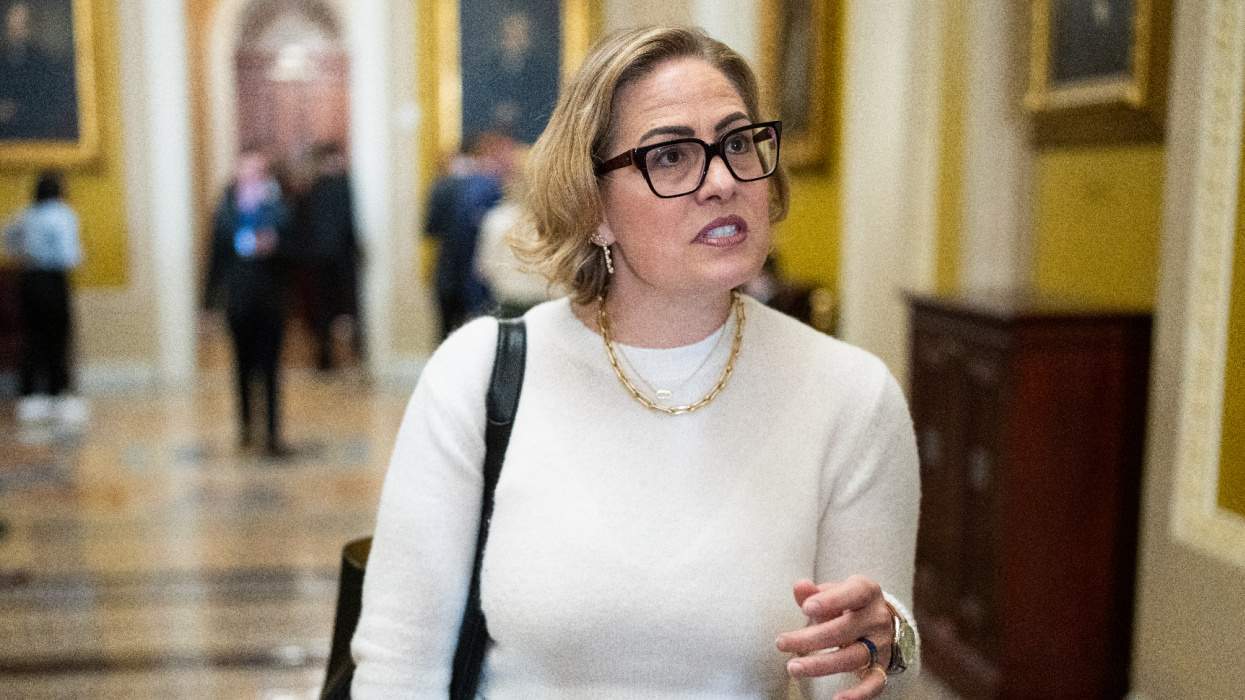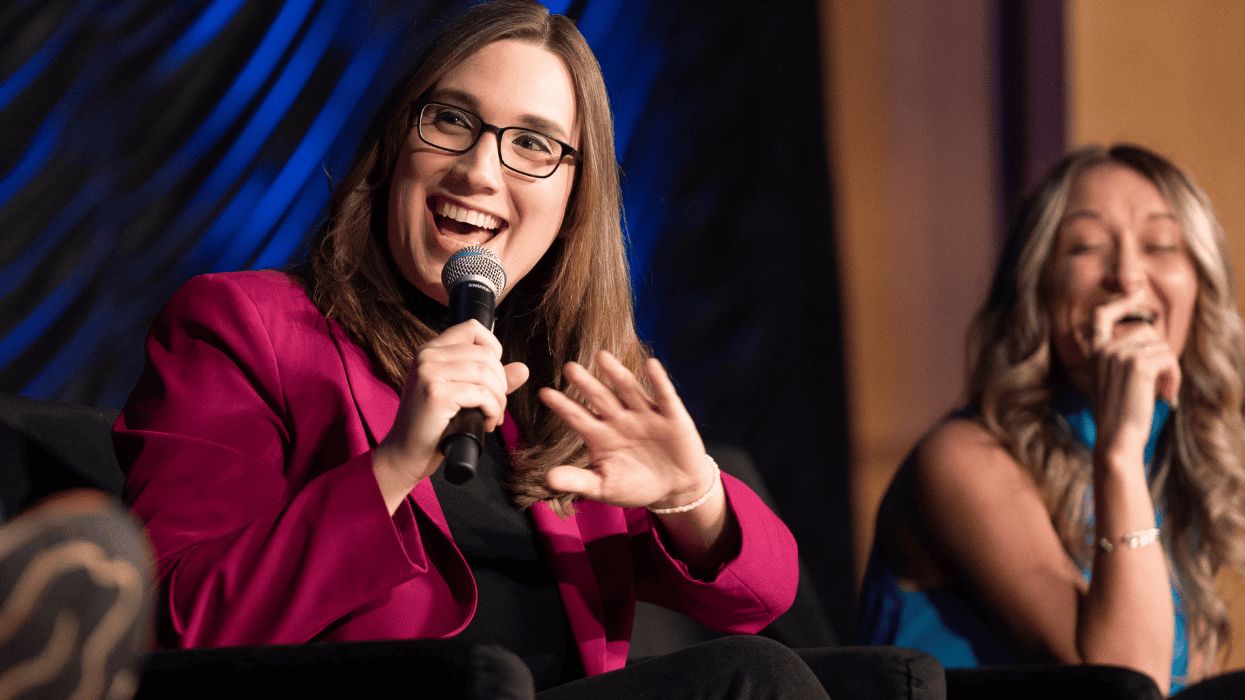This interview was conducted as part of the interview series, LGBTQ&A, a weekly podcast that documents modern queer and trans history.
Margaret Cho grew up in San Fransisco, coming of age at the start of the AIDS crisis. Her parents owned a gay book store; Cho worked at a lesbian BDSM collective and had a brief stint as a dominatrix. It was during this time Cho started asking the question, "In the age of AIDS, what does safe sex mean? And how do we still make it exciting and fun?"
The answer came in the form of a long leather whip. She describes BDSM as the perfect place to engage and celebrate sexuality in a way that felt dangerous, without being dangerous in a way that would transmit HIV or other infections.
All of these experiences have fed into her comedy career, the cornerstone of which has been marked by her candor. Before nonmonogamy had entered the mainstream consciousness as it has today, Cho was talking about it onstage and in interviews, just as she would speak about people's disbelief over her bisexuality, her experience with sex work, and more recently, her newfound "polyamory-fatigue."
Cho speaks about all this on the LGBTQ&A podcast, and opens up about why she now plans on being single for the rest of her life.
[Click here to listen to the full podcast interview with Margaret Cho.]
Jeffrey Masters: Do you have any grand theories to why people are still so wary of bisexuality?
Margaret Cho: I think it's because people use bisexuality as the lie before they get to the truth. You're acknowledging your otherness, but you're not willing to go all the way. To say you're bi, a lot of people when they're coming out, they'll stop at bi at their first utterance of who I am. I'm going to give you bisexual. I'm going to give this lie to my parents so that maybe there's hope for them to hang on to this idea that I could be straight.
Before we had gay marriage and before we had this idea of being able to have families, bisexuality gave you a little bit of a sliver of that ticket to normalcy. Bisexuality is seen as this strange thing of dipping your toe into the pool of otherness, but not all way all in.
JM: Was there comradery between you and other famous, closeted queer women before you came out?
MC: I remember I was sitting on Lea DeLaria's lap in, gosh, 1991. My manager at the time was so panicked that I was gay and he was like, "You know, you have to present yourself as straight. I don't care what you do or who you are. As far as we're going, you're straight."
I was just really scared into a feeling of Wow, this feels really scary and unsafe.
JM: I was actually under the impression that you were open about being bi, even early in your career.
MC: I always was, but at that time, I don't know we could even call it that. I had grown up in a very gay-positive environment -- my parents owned a gay bookstore and there were so many examples of very, very exciting things happening around me with Harvey Milk and this gay pride parade that was growing and growing and growing every year -- but there was a real confusion around bisexuality.
Even my parents, they're fine with gayness, they're fine with straightness, they have a real problem with bi.
JM: So your sexuality just wasn't publicly talked about?
MC: People just didn't ask those questions. Showbiz was very different. There was a very curated image that you were putting out there.
JM: Have you always been so comfortable talking about sex?
MC: I think so. I started comedy so young and it was easy to talk about sex. That was a way to get people to really pay attention. Then also, I was really discovering a lot. I was at these weird day jobs. I was working at this lesbian BDSM collective where they were making leather dildos and stuff and they had play. I was learning all about BDSM and all this different kind of stuff.
Sex was different too because we were looking for a way that we could still be queer, but also in the age of AIDS, what does safe sex mean? And how do we still make it exciting and fun? Because dental dams were not fun, and so we wanted to figure out how to make sex dangerous for us, but not really dangerous in that we're not fluid bonding.
BDSM was a perfect place to celebrate that and to explore that even further. I was fascinated because I was discovering it as it was happening and it was something that was very appealing to talk about too.
JM: For you, BDSM came out of the AIDS crisis.
MC: Yeah. We were trying to figure out how to keep sex hot and keep it interesting and dangerous.
What BDSM does is it really puts the danger back into sexuality. So much of the mentally about AIDS was about separating ourselves. We had to have this layer of latex between us and the world. How can we now go back and really be gay and be in it and be of it? And so BDSM was the answer then.
It's very alternative, but it's also very San Francisco. In San Francisco, if you're going anywhere, you're low-key listening to people talking about their limits. What's their hard limit and what's their soft limit? People are always negotiating their scenes, so I love that.
JM: What are your limits?
MC: I don't like blood play. Don't come at me with the cane. No canes. I'm not particularly fond of race play. However, some people really like it. I don't like it. Oh, I do love a hood. I love a hood and I love human play.
There's a human puppy play park. That's a great one too. Then you get into sort of furry territory. I love that, but I don't know if that's so much about the sexual impulse as much as it's about playtime because I love animals.
JM: Do you still engage in BDSM?
MC: No. You know, for me, I get polyamory-fatigue and I get total BDSM-fatigue. It takes so much energy in terms of negotiating and what you want and what you're doing and I just don't have the energy for it.
Also, the processing that happens, so I did get tired of it. To me, it's very stuck in the 90s and early 2000s, but I do love it.
JM: Are you still discovering new things that you like?
MC: Yeah, I really was trying to be adventurous and I tried to discover different things that I liked and I had this idea, I really want to be fisted, but I could never ever get anybody to get their thumb all the way in. I felt like a failure at that.
Now I'm on a new journey of like, "What does this look like?" I have this idea that because I'm now single, my thought is I would like to try to remain unpartnered for the rest of my life and I'm going to really try.
JM: Why is that?
MC: Well, because I've been partnered for so long. For my adult life, I've had partners pretty much since I was like 25 or whatever. I feel like now that I'm 50, I should really give a college try to see if I could just be a lady alone.
JM: Why do that for the rest of your life and not a shorter period of time?
MC: Well, because every time I've been partnered, it's always been this issue. I've always really wished to be alone and I would really like to give that a fair shot because that's what I've always wanted.
That solitary life is really important, but I do want to have sex still. That's a very confusing thing to me too, because I have not been single in the age of apps, so I'm like trying to start that journey to see what it looks like.
JM: How has your relationship to masturbation changed?
MC: I do try to be more creative and try to be more alert as to like, Well, I'm not going to come to this one again because I already came to that, so I'm going to try to come to something different and I'm not going to stop until I can do it.
JM: You're setting goals.
MC: I'm setting goals. So now it's also using my vibrators. I'm trying to switch to a different kind of vibration. My recommendation for most people who like vibrators is to go to the Eroscillator because it doesn't numb you out as like other vibrators.
I think it's a necessary part of sexuality, especially to discover what you like so that when you have partnered sex, you can instruct them on what to do and then maybe they'll show you what they need. I think that's what masturbation is really good for. It's going to give somebody this entry into my being that is very exclusive and very, very intimate and very important, and if somebody else can grasp that and then possibly reciprocate, that's intimacy.
That's really true love, if that was to exist. That's what I think it is.
JM: Does true love not exist?
MC: I think it exists in ways. I think that there is love definitely that can exist. It has existed before in my life, but in my life it's been very fleeting and really compromised by the necessity of togetherness, marriage, the kind of partnering that I'm trying to avoid.
JM: How many times have you been in love?
MC: Oh gosh. I would say a good 15 or 16 times slowly in my life, but really, it's been compromised by the situation at hand, by what we tried to turn it into, by whatever they were looking for, whatever I was looking for. It was always something that was stunted because of something that we were trying to force.
JM: I think 15 or 16 is a lot.
MC: It's good because it's like...I do try to keep my heart open, which can be challenging because you do get your feelings hurt, but just how I'd rather be.
[Click here to listen to the full podcast interview with Margaret Cho.]
New episodes of the LGBTQ&A podcast come out every Tuesday, only on the Luminary app. Click here to listen.















